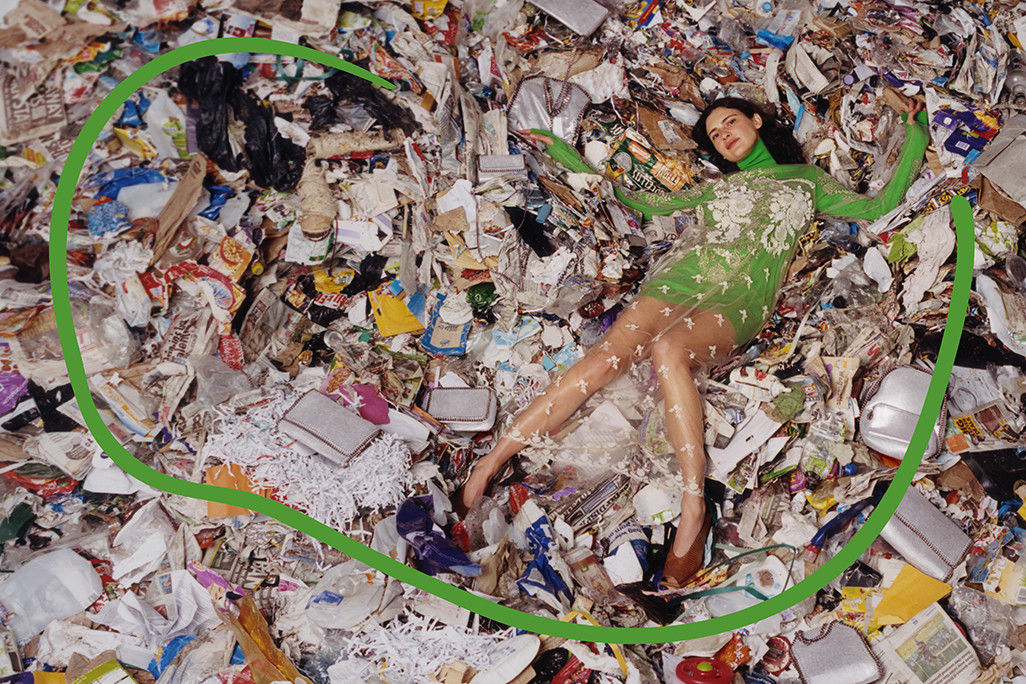
Fashion is a highly dynamic global industry that employs hundreds of millions of people. It generates very significant revenue and reaches almost everyone. Every year, 130 billion garments are produced and more than a billion tonnes of greenhouse gases make fashion the second most polluting industry just after oil.
Since the 20th century, this industry has become globalized, clothing is designed in one country, made in another, and sold around the world at an ever faster pace.
For 15 years, this trend has been accentuated because of the almost world-wide emergence of a middle class with a higher income and the apparition of Fast Fashion that produces far from our eyes, at a very low cost, extremely cheap clothes that are sometimes because of their poor quality perceived as disposable.

Stella McCartney 2017
On April 24, 2013 the Rana Plaza collapsed in Bangladesh. This building housed garment factories, working for international clothing brands and 1127 workers died that day. This drama has helped Western consumers to become aware of the limits of fast fashion.
The time has come to change this system for a system that delivers better economic, societal and environmental outcomes. Many of us want more transparency and are looking for brands that move in this direction.
How to go from a disposable fashion to a sustainable fashion?
From 2 annual seasonal collections, the major brands have grown to 8 or 20 collections a year, Zara, a leader in fast fashion designs up to 30,000 models each year. This frantic race at a huge societal and environmental price.
Mentalities are changing 66% of 12-25 year olds want to spend their money in sustainable brands and this quest for transparency leads brands to evolve. As of today alternatives are there: slow fashion, green fashion, ethical fashion ..
For these initiatives to develop and become the new norm it is necessary to change narrative and reality: ecology must become desirable. Tomorrow, we will have to rhyme ethically and aesthetically.
We must put the fashion system flat: reinvent the way we produce natural raw materials (linen, cotton, silk, wool ..) or synthetic (polyester, polyamide ..) create new materials with mushrooms, waste plants, seriously imagine using natural dyes for the industry …
Some brands are already very active, we think of course of Veja in France, Patagonia and Everlane in the USA, Stella McCartney in England …
What need to be done is huge and exciting, some foundations actively seek solutions like the Ellen MacArthur Foundation, initiatives are launched everywhere like the Fashion Revolution and many others …

FASHION HORIZON(S)
For several years, I have partnered with Utopies, a firm that supports companies in need of integration of sustainable development. This approach touches and inspires me.
We decided to partner with a series of inspirational and immersive conferences to share our vision.
Thursday, October 4, 2018, with Elisabeth Laville founder and director of Utopies, I will have the pleasure to introduce FASHION HORIZON(S): a morning of conferences, a round table and a mini-village of start-ups to explore trends, issues and solutions for sustainable and desirable fashion from 9am to 12.30pm.
I will decipher the 4 major axes of the Fashion of tomorrow and their stakes. Elisabeth will analyze the actions already taken by industrialists and those just beginning.
A round table will welcome experts and committed actors: Julia Faure, co-founder of LOOM, a brand that defends a slow fashion. Majdouline Sbaï, sociologist, author of « Ethical fashion is it possible? » And also organizer of Fashion Green Days. Damien Pellé, Galeries Lafayette Sustainable Development Director and also coordinator of the Go for Good approach – responsible products for a more engaged business.
Innovative entrepreneurs will be present in a mini village of start ups: CrushON, DAO, Kabanes, Panafrica and les récupérables.
We have been so interested in the frenzy of Fashion for several decades that we have forgotten to love clothes… Join me at FASHION HORIZON(S) to imagine together the future of Fashion.

















